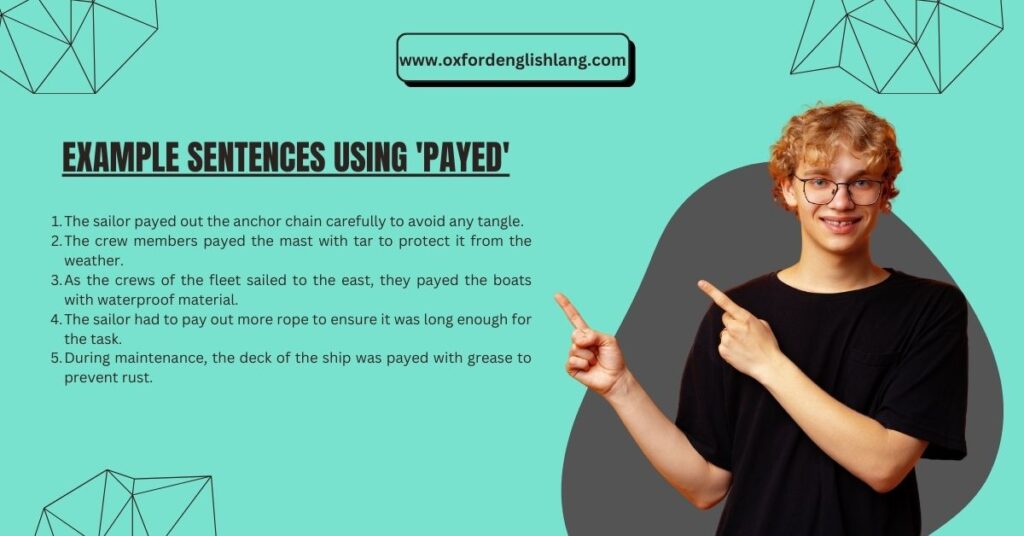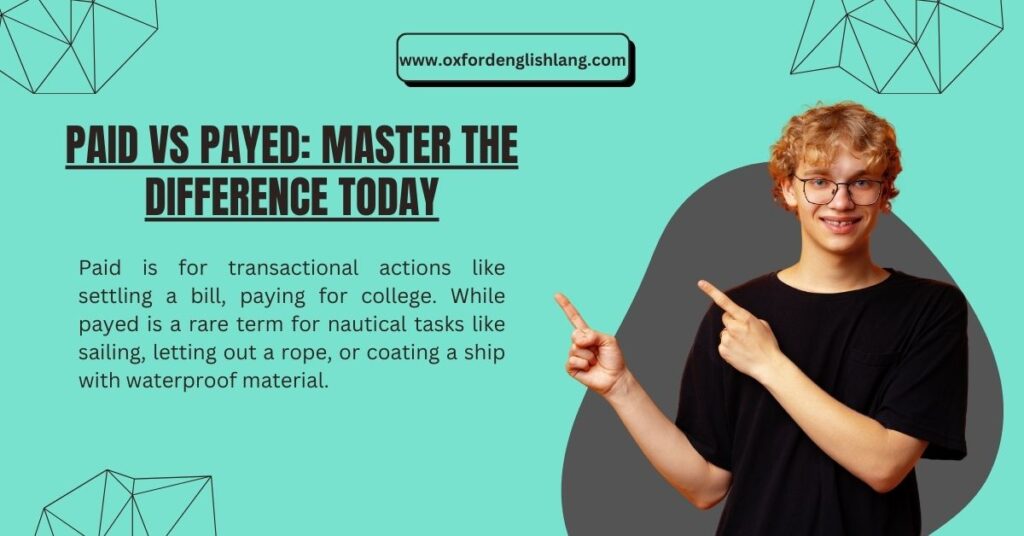When it comes to English, the differences between “paid” and “payed” can sometimes create confusion, even for those who paid attention in grammar classes. The past tense and past participle of the irregular verb “pay” are typically “paid,” but there are rare cases where “payed” is the correct form.
For example, “payed” is used in nautical contexts like waterproofing a ship with tar or securing its seams.
This article aims to explore these differences, explain their definition, and provide examples that show how each form is used. Native speakers often rely on their intuition, but learning tips from experienced editors can be crucial for clear communication. Whether you’re settling a debt or striving to write an effective blog, understanding these nuances will help you choose the right word every time.
Payed vs. paid: What’s the difference?
The difference between paid and payed depends on the contexts in which they are used.
Paid is for transactional actions like settling a bill, paying for college. While payed is a rare term for nautical tasks like sailing, letting out a rope, or coating a ship with waterproof material.
Exploring the Term ‘Payed’
The term payed is a rare and unique word, often overlooked in everyday language. It refers to a past tense of pay used in nautical contexts, like when letting out a rope or chain or applying waterproof material to a boat or its coating. Although its usage is not as widespread as its more common counterpart, paid, payed holds a fascinating place in terminology related to sails and seafaring.
It’s important to explore its contexts to understand how and when to use it properly, ensuring it’s not mistaken for the more familiar form, paid.
You Might also like: Affirm Vs Confirm: Master the Key Difference!
Uses of payed
The term payed is rare and is mostly used in seafaring and nautical contexts. It refers to the act of securing a rope, chain, or line by fastening it around a cleat or bollard. This term is also used in the phrasal verb “pay out,” which means to slacken or let out the rope or line on a boat.
It can be related to the process of protecting the parts of a boat with materials like tar, paint, or grease. In sailing, payed is a vital term for securing equipment and ensuring safety on the water, making it a key part of the task of maintaining a vessel. It’s a fascinating example of how language adapts to fit specific professions and environments.
Example Sentences Using ‘Payed’

- The sailor payed out the anchor chain carefully to avoid any tangle.
- The crew members payed the mast with tar to protect it from the weather.
- As the crews of the fleet sailed to the east, they payed the boats with waterproof material.
- The sailor had to pay out more rope to ensure it was long enough for the task.
- During maintenance, the deck of the ship was payed with grease to prevent rust.
- The ship’s hull was payed with tar to make it watertight.
- The ropes were payed out gradually to prevent any abrupt jerks.
- After the storm, the damage to the hull was severe, so the crew had to pay the ship’s hull with tar again.
- Klara payed out the rope quickly as she rappelled down the cliff.
- The sailors payed the spar of the boat with grease to protect it from the elements.
Delving into the Term ‘Paid’
The word paid is the past tense of the verb pay, and it is commonly used to settle a bill or cover the cost of something. It is often part of a course of action, signifying that an exchange has occurred. Understanding the usage of paid through examples helps to clarify its meaning and difference from other terms. This term is crucial in many contexts, and it plays a vital role in various transactions, whether financial or transactional in nature.
Uses of paid
Paid is commonly used to describe the action of exchanging money for goods or services, especially when referring to a financial transaction. It is the past tense and past participle form of the verb pay, an irregular verb that does not follow the typical suffix rules. For example, when a bill is settled, we say it has been paid. In other cases, it can refer to compensation or recompense for a particular course of action.
Paid can also signify the consequence of an action, especially in contexts where someone has fulfilled their obligation or received something in return. It’s important to understand that paid can also be used in a variety of meanings, such as paying attention, offering a compliment, or even a visit.
Example Sentences Using “ Paid “
- I paid for my ticket to the plane ride, but it was overbooked.
- After a long day at work, I paid for a meal at the restaurant.
- The builders paid the price for their negligence when the bridge collapsed.
- She paid $50 for the chairs at the yard sale.
- After revising for the exam, Sam paid the price for not studying enough.
- The businesswoman paid her dues to the club every month.
- The pirate paid with his life for his actions.
- I paid in advance for the hotel room to secure my position.
- The job paid well, but the consequences were severe due to the suffering involved.
- The car was paid for by Debbie’s parents as a gift for her graduation.
You Might also like: Has Ran or Has Run? which one is actually correct
Common Mistakes and How to Avoid Them
When writing quickly, many people confuse paid and payed. The word paid is the correct past tense of pay and is used when you have settled a debt or bills, like in the sentence, “I have paid the bills.” On the other hand, paying a deck with tar or pitch is the proper use of payed, typically in a nautical context, like when sailors pay the deck.
The key to avoiding this mistake is to pay close attention to the meaning and uses of these words. Effective communication requires knowing when to use each term to prevent confusion.
Tips from Native English Editors
To improve your understanding of paid vs payed, native English editors often recommend regular practice. For example, using a grammar checker or AI tools can help you spot common mistakes. Pay special attention to the context in which each word is used—paid is typically used for financial transactions like paying bills, while payed is a nautical term referring to actions like a ship paying out its anchor.
Native English editors suggest reading examples to clarify any doubts and improve your communication skills. Additionally, it’s important to stay updated with evolving language usage to avoid confusion in your writing.
FAQs
Is it “I payed” or “paid”?
The words “paid” and “payed” are often mixed up because they sound alike.
“Paid” is the past tense and past participle of the verb “pay,” which involves giving money in exchange for goods or services (e.g., “I paid for the vacation with the extra hours I worked during the year”).
On the other hand, “pay”ed is used in a specific context, referring to letting out a rope or chain gradually in a controlled manner (e.g., “I payed out the rope carefully as my student climbed down the cliff”).
Is it “paid” or “payed” money?
The words “paid” and “payed” are often confused because they sound the same.
“Paid” is the past tense and past participle of the verb “pay,” which refers to giving money in exchange for goods or services (e.g., “I paid money as part of the trade-in deal for my new car”).
“Payed” has a less common meaning, referring to letting out a rope or chain in a controlled manner, often used in activities like boating or climbing (e.g., “The rescuers payed out the rope as the lifeguard entered the water”).

david Miller is an experienced English language expert with a deep passion for helping others communicate effectively and confidently. With a background in linguistics and literature, He provides clear, accessible insights on grammar, writing, and communication strategies. Through well-researched articles and practical advice, David Miller aims to make language learning both inspiring and achievable for readers of all levels.


